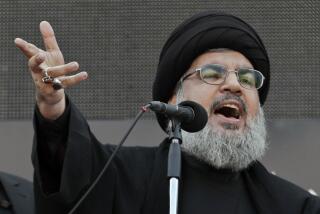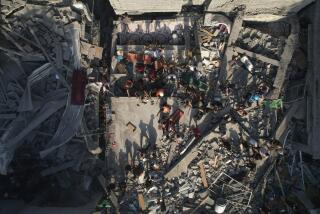Arab nationalist planned hijackings
- Share via
George Habash, the founder of Arab nationalism and architect of the infamous airline hijackings of the 1960s and ‘70s that brought the search for a Palestinian homeland terrifyingly close to home for millions around the world, died Saturday in Amman, Jordan.
Bedridden for years and partially paralyzed after two strokes, Habash died of a heart attack in an Amman hospital five days after surgery to implant a stent, his surgeon, Harran Zreiqat, told the Associated Press. He was believed to be 82, but the precise date of his birth could not be confirmed.
His death came at a time of bitter divisions in the Palestinian movement between revolutionaries convinced, as he was, that violence is the only effective way to achieve a Palestinian state, and moderates who favor the diplomatic route.
With a wave of airline hijackings and the headline-grabbing seizure of a French airliner at Entebbe, Uganda, in 1976, Habash’s Popular Front for the Liberation of Palestine (PFLP) inspired an image of ruthlessness in a Western psyche unattuned to the violent politics of the Middle East.
But after the collapse of the Soviet Union, which had supported them, Habash and his radical contemporaries found themselves increasingly marginalized, hidden away in secret offices in Syria while the Palestine Liberation Organization’s mainstream moved toward accommodation with Israel and the West.
Habash nonetheless remained an idol to the movement’s leftist intellectuals and disenfranchised thousands who inhabit Palestinian refugee camps in Jordan, Lebanon and Syria.
A Marxist physician who dreamed that a united Arab nation could force Israel to give back Palestine, Habash played the revolutionary to PLO Chairman Yasser Arafat’s role of politician, frequently ridiculing Arafat’s checkered headdress and military uniform.
His quarreling with Arafat, who died in 2004, defined the Palestinian movement’s choices for decades, just as the split between Mahmoud Abbas, Arafat’s diplomacy-minded successor, and the militant Islamic group Hamas does today.
Accusing Arafat of selling out the Palestinian cause to the United States and Israel, Habash resisted all attempts to arrive at a negotiated resolution to the Arab-Israeli conflict that did not involve the return of Palestinians to their historic homelands in Jerusalem, Haifa and Jaffa.
For millions of young Arabs, Habash represented the voice that said no to Western intervention in the Middle East and to the Arab regimes, such as Saudi Arabia, Kuwait and Egypt, that had allowed U.S. interests to dominate the region. He saw the Palestinian cause as part of a global struggle, and defended international terrorism as a way of drawing attention to it.
The son of a Greek Orthodox wheat merchant, Habash reportedly believed that he was prevented from assuming control of the PLO because he was not a Muslim. He was born in 1925 in the village of Lydda, now Lod, the site of Israel’s Ben-Gurion International Airport near Tel Aviv.
The village fell to Israeli control after a fierce bombardment in 1948, and Habash fled to Lebanon after being seized and beaten by Israeli soldiers.
He studied medicine at the American University of Beirut, founding a series of radical student organizations that called for unifying the Arabs’ military might to annihilate Israel.
After Israeli forces crushed an Arab assault and moved into the West Bank, Gaza Strip, East Jerusalem and Syria’s Golan Heights in the 1967 Middle East War, Habash formed the PFLP to continue operations against Israelis. It became the second-largest faction within the PLO, after Arafat’s Fatah organization.
In one of its first operations, an Israeli El Al airliner was hijacked to Algiers in July 1968, forcing the Israelis to free 16 Palestinian prisoners in exchange for the release of the plane and its passengers.
Two years later, PFLP guerrillas hijacked four airliners in September 1970, blowing up an American Boeing 747 at Cairo International Airport and holding about 500 passengers from the other three aircraft hostage in Jordan.
“When we hijack a plane, it has more effect than if we killed a hundred Israelis in battle,” Habash once said. “For decades, world public opinion has been neither for nor against the Palestinians. It simply ignored us. At least the world’s talking about us now.”
The hijackings prompted Jordan’s King Hussein to expel the Palestinians. Habash publicly renounced hijackings in the early 1970s.
But the terror did not stop. In May 1972, the PFLP used Japanese Red Army guerrillas to conduct a machine-gun attack on the Tel Aviv airport’s terminal building, resulting in the deaths of 27 civilians. Two years later, PFLP operatives threw hand grenades into a Tel Aviv theater, killing three and injuring 54.
And in June 1976, Habash’s chief lieutenant, Wadia Haddad, directed the hijacking of a French A-300 Airbus to Entebbe, Uganda, with the aid of a transnational terrorist force. Four civilians were killed in a dramatic rescue operation undertaken by Israeli commandos, who killed all seven gunmen and about 30 Ugandan soldiers.
Some later reports said that Haddad had broken with Habash before Entebbe, but Habash remained opposed to Arafat’s attempts to reach accommodation with Israel and the West.
Habash was infuriated by Arafat’s public renunciation of terrorism in 1988 and his recognition of United Nations Resolution 242, which implied Israel’s right to exist.
And he rejected Arafat’s 1993 interim agreement with Israel that created an autonomous Palestinian government in the West Bank and Gaza Strip. He refused to move there, claiming that Arafat was deluding Palestinians by making them think full independence was around the corner.
Palestinians, he said, must accept the idea that they might have to fight for the rest of their lives, to simply outlast the Israelis, so that their children might call Palestine home; and they must continuously remind the world that their demands are unchanged and unchangeable.
“I believe that 6 million Palestinians, if they say we want only self- determination, they will get it,” he told The Times in a 1991 interview. “Imagine. Six million saying daily, daily, daily, ‘We want self-determination, we want self-determination.’ And expressing this by all means. I see it very clearly, that we will succeed. Why not?”
Partially paralyzed by a stroke in 1979, Habash could walk only with the aid of a cane and increasingly was confined to his well-guarded office in Syria, with its pictures of Palestine and a woven tapestry of Jerusalem’s Dome of the Rock, Islam’s holiest shrine.
He suffered a second stroke in 1992 and moved to Jordan later that year. In 2000, he stepped down as PFLP general secretary.
Habash’s wife, Hilda, and two daughters were at his bedside when he died.
Palestinians divided over how to deal with Israel joined in praising Habash on Saturday. Abbas, who took over Arafat’s efforts to negotiate Palestinian statehood, declared a three-day mourning period.
A senior Hamas official in Damascus, Mohammad Nazzal, called Habash’s death a “huge loss.”
“We had our ideological differences, but Dr. Habash shared Hamas’ opposition to the peace deals the PLO signed with the Jewish state as a sellout of Palestinian rights,” Nazzal said.
Leila Khaled, a longtime PFLP activist, said Habash was likely to be buried in Jordan.
--
Times staff writer Richard Boudreaux contributed to this report from Jerusalem.
More to Read
Sign up for Essential California
The most important California stories and recommendations in your inbox every morning.
You may occasionally receive promotional content from the Los Angeles Times.












